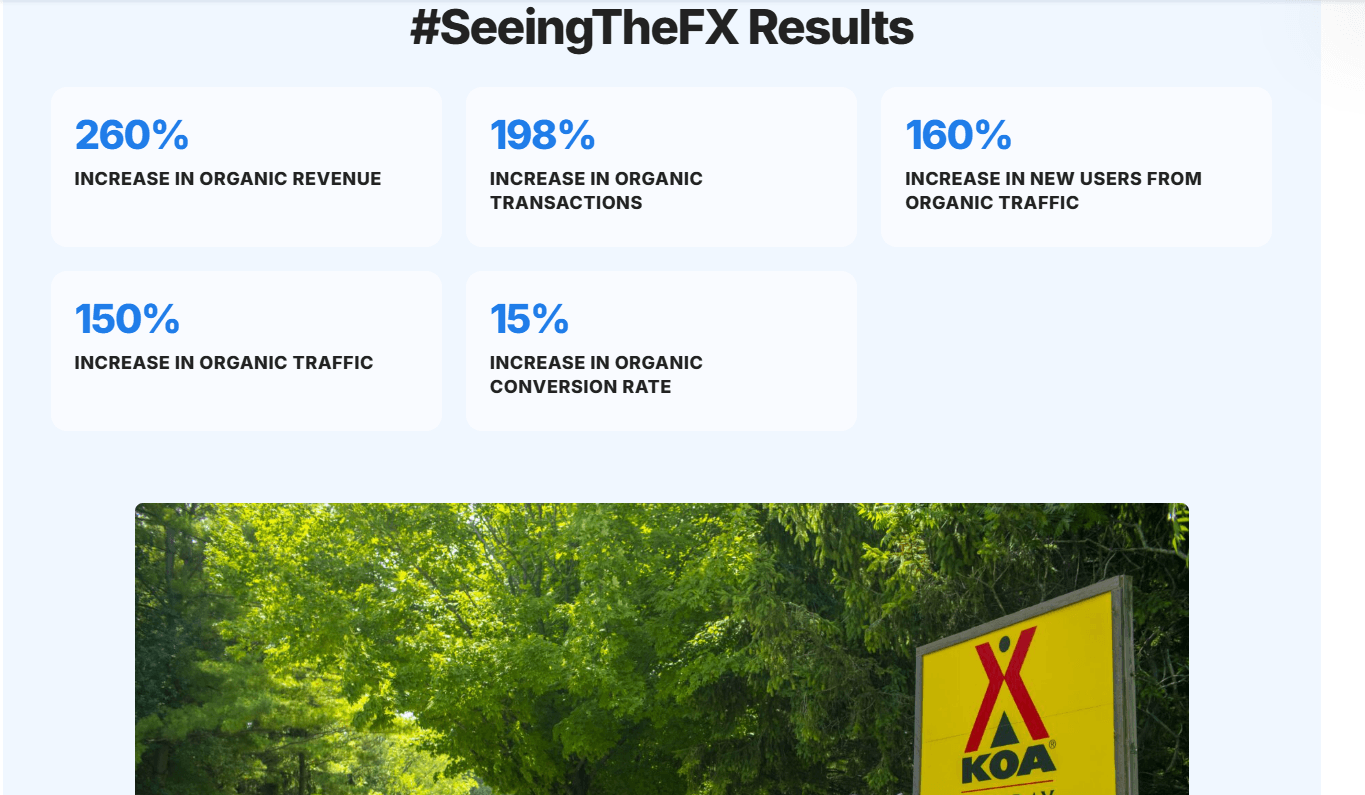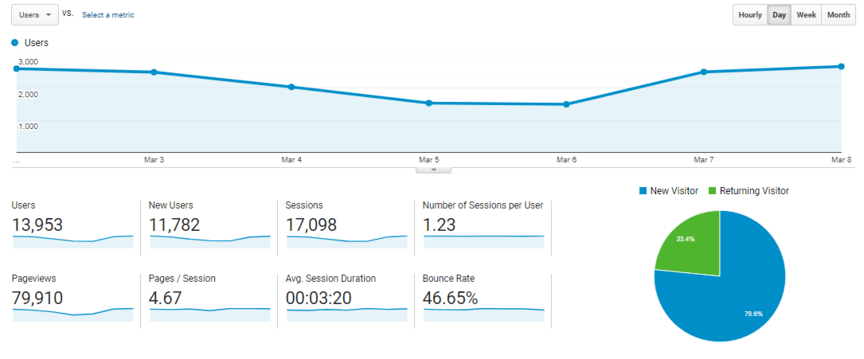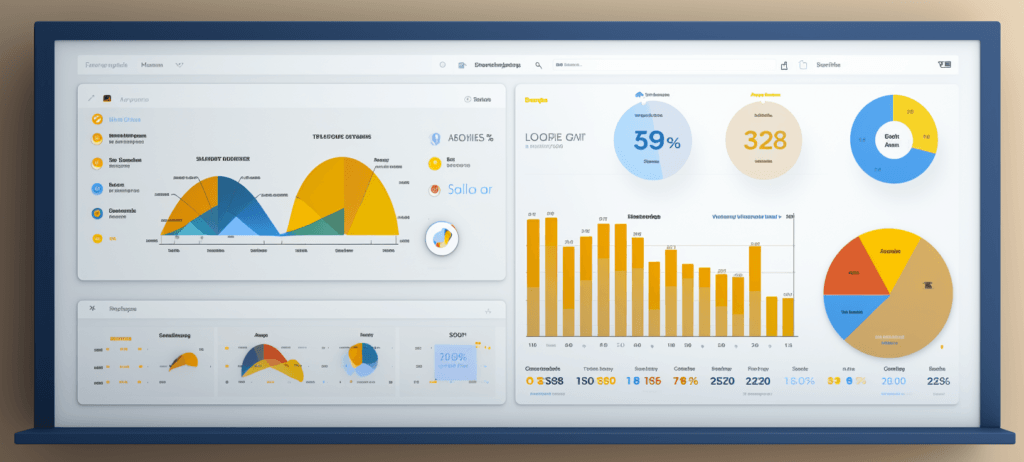-
 Published: Apr 1, 2025
Published: Apr 1, 2025
-
 8 min. read
8 min. read
-
Summarize in ChatGPT
-
 Lornah Ngugi
Lornah Ngugi Marketing Writer
Marketing Writer
- Lornah Ngugi is a seasoned digital marketing writer with 6+ years of experience translating complex marketing strategies into engaging, results-driven content. She holds a B.S. in Business Information Technology and is certified in HubSpot Academy, Google Analytics, LinkedIn Marketing, and Google Digital Academy. Lornah regularly contributes to the WebFX blog and SEO.com, where she’s authored hundreds of marketing guides that help readers turn their goals into measurable results through practical, data-informed insights. When she’s not writing, you’ll find her enjoying a quiet walk in the park, sipping black coffee, or finding creative inspiration in a good chocolate bar.
Key Takeaway
Only 54% of digital marketers are confident in how they measure and report their digital marketing ROI.
Digital marketing reporting is the key to tracking valuable metrics and data that inform your marketing strategies so you can earn the highest possible return on investment (ROI) for your company.
Effective and efficient digital marketing reports help companies make informed decisions about their marketing strategies and campaigns. When done right, digital marketing reporting helps businesses align campaigns and efforts with a company’s strategic goals and find opportunities for growth and improvement.
According to Nielsen Annual Marketing Report, only 64% of digital marketers are confident in how they measure and report their digital marketing ROI. To help you increase your knowledge and confidence in digital marketing reports, we bring you this comprehensive guide on everything there is to know about creating them.
Here is a brief overview of some of the topics we’ll cover on this page:
What is digital marketing reporting?
Digital marketing reporting is the process of collecting, analyzing, and compiling data about your digital marketing strategies in a structured form. Depending on your current strategies and goals, your report can consist of various metrics and data points to help you track the success of your campaigns.
Businesses need digital marketing reports to justify their marketing budgets, measure progress, evaluate campaign performance, and power data-driven decisions. Well-compiled reports act as a storytelling and data visualization tool that details campaign performance.
The goal of digital marketing reports is to prove your return on investment (ROI) from the numerous strategies you’re implementing. A good digital marketing report goes beyond the numbers to show the return on the results.
Just as you can see in this KOA case study for ongoing SEO, PPC, and content marketing campaigns we launched for them:

Why does digital marketing reporting matter?
Digital marketing reports include ROI metrics, which makes them more than performance summaries — they’re financial proof points. Their main benefits lie in their ability to connect campaign activity to actual business outcomes and how each channel contributes revenue and profit.
At its core, digital marketing reporting bridges the gap between data and decisions. When built around ROI, these reports help businesses:
- Promote open communication: Digital marketing reports show clients what you’ve been able to achieve and what you intend to do to close the gap. This matters because, according to 36% of digital marketing agencies, transparency and communication are the leading drivers of client retention.
- Verify the impact of digital marketing: Marketing reports provide real-time data on key metrics like conversion rates, bounce rates, click-through rates, and ROI for every digital marketing channel and strategy.
- Identify optimization opportunities: Analyzing the data on digital marketing reports helps marketers and clients to see what’s working, what’s not, and what can be done better.
- Facilitate data-driven decision-making: Successful marketing campaigns use data and analytics to fast-track business decisions. Recent research indicates that 76% of organizations leverage marketing analytics for decision-making and 56% to shape strategy.
Tools for digital marketing reporting
While it’s possible to collect, analyze, and report digital marketing data manually, it’s time-consuming and wastes resources. Professional marketers utilize innovative data collection and reporting tools to save time and ensure the accuracy of the reports.
RevenueCloudFX is a cutting-edge WebFX smart reporting tool with 20+ features to track, measure, and report data to drive revenue through marketing. It provides 20% billion-plus data points and can deliver at least a 20% average ROI increase.
Other effective digital marketing reporting tools, such as Google Analytics, Whatagraph, and Google Looker Studio, are great for automating data analysis and creating comprehensive reports and dashboards.
How to create a digital marketing report that proves ROI
While each type of report will require individual, unique sections, there are a few common elements that most reports will have. Here are those common topics:
1. Select which metrics you want to measure
Perhaps the most important element of your marketing report is selecting the data and metrics you want to measure. These must align directly with your strategic business goals and marketing objectives.
For example, if you want to increase your web traffic, you’ll want to focus on analyzing traffic sources to see which strategies are driving the most users to your website.

The following key digital marketing metrics prove your ROI and deserve a spot in your digital marketing report every time:
You can also track essential audience behavior data on your website, such as how much time users spend on your web pages and their demographics, such as age and location.
Avoid wasting your time with vanity metrics, which are headline-grabbing metrics that don’t represent website or business health. Some popular examples of vanity metrics include social media followers, website visitors, and keyword rankings.
2. Choose a reporting frequency
You need to prepare regular digital marketing reports, maybe weekly, bi-weekly, monthly, or quarterly. Frequent reports will give you confidence that you’re getting your marketing investment’s worth and keep you accountable.
How often you prepare the reports is based on the scope and duration of your campaigns. You should choose a reporting frequency that meets your needs and stick to it, and here are your options:
- Weekly reports: These are ideal for fast-moving campaigns, like PPC, which require quick, ongoing optimization. They’re also necessary in the early campaign stages to track real-time performance.
- Monthly reports: These are comprehensive reports that allow for trend, pattern, and behavior identification as well as facilitating timely campaign adjustments.
- Quarterly reports: These are necessary for strategic performance reviews and digital marketing budget planning.
- Annual reports: These are executive-level summaries, great for long-time ongoing campaigns and comparing different reporting periods.
3. Compile your report and analyze your results
Once you’ve implemented your marketing strategies, picked your reporting frequency, and chosen the metrics you want to measure, it’s time to compile your digital marketing report.
Be sure to include critical metrics for each of your strategies so you can easily measure the performance of your campaigns and your progress toward your business goals. And once you’ve compiled your report, it’s essential to analyze your marketing results.

Take note of which campaigns drive the most web traffic, leads, and conversions for your business. You can also analyze your audience’s behavioral data to better understand which strategies your target audience responds to the most.
As a result, you can identify areas of your strategies that need improvements, so you can optimize your campaigns to drive more sales and revenue for your business.
Download Now: Free Digital Marketing Report Template
4. Measure marketing performance and ROI
Digital marketing reports aren’t just about listing data from every channel — they’re about connecting performance metrics to tangible business outcomes.
Your report should break down how every campaign, engagement, and channel contributes to your bottom line. To prove your ROI from your digital marketing report, you need to combine the performance data from each campaign across different channels, your website, and social media channels.
Let’s say you just launched a new product, you’re running a 3-channel marketing campaign: a paid ads campaign to boost sales, supporting it with organic blog content, and amplifying awareness through social media posts.
If you spend $8,000 total on marketing for the month and you generate $36,000 total in new sales.
You can use this formula to calculate your digital marketing ROI:
[(return – investment)/ investment] x 100 = ROI
When you plug in the numbers:
ROI = [(36,000 – 8,000) / 8,000] × 100 = 350%
That means for every dollar you spent on marketing, you earned $3.50 in return — clear proof that your campaigns are driving measurable value.
Alternatively, use our free ROI calculator:
Common mistakes in digital marketing reporting
Marketing reporting fails to deliver desired results when marketers make the following mistakes when collecting data, analyzing metrics, and reporting. Below we highlight the most common marketing reporting fails:
- Considering vanity metrics: These waste resources on metrics that don’t directly translate to driving revenue or other tangible results.
- Using unreliable data sources: These lead to inaccuracies in your reports with long-term negative impacts.
- Lacking visualizations: Without visuals, digital marketing reports are complex, boring, and difficult to interpret.
- Failing to compare different periods: Comparing marketing report periods helps businesses make data-driven decisions for future campaigns.
Track and manage your digital marketing strategies with transparent reports from WebFX
If you want to track and manage your digital marketing strategies with ease, WebFX can help! WebFX is an industry-leading digital marketing agency specializing in tracking and analyzing essential metrics to create data-driven strategies that boost revenue.
When you partner with WebFX, we’ll take care of implementing and managing your digital marketing strategies so you can focus on your other business tasks. We’ll also keep you informed every step of the way with our frequent, transparent reports.
In just the past few years, we’ve helped businesses just like yours drive over $10 billion in revenue with our data-driven marketing campaigns and award-winning software, RevenueCloudFX.
Speak with one of our strategists today by calling 888-601-5359 or contact us online to learn more about how our digital marketing services can drive sales and revenue for your business.
-
 Lornah Ngugi is a seasoned digital marketing writer with 6+ years of experience translating complex marketing strategies into engaging, results-driven content. She holds a B.S. in Business Information Technology and is certified in HubSpot Academy, Google Analytics, LinkedIn Marketing, and Google Digital Academy. Lornah regularly contributes to the WebFX blog and SEO.com, where she’s authored hundreds of marketing guides that help readers turn their goals into measurable results through practical, data-informed insights. When she’s not writing, you’ll find her enjoying a quiet walk in the park, sipping black coffee, or finding creative inspiration in a good chocolate bar.
Lornah Ngugi is a seasoned digital marketing writer with 6+ years of experience translating complex marketing strategies into engaging, results-driven content. She holds a B.S. in Business Information Technology and is certified in HubSpot Academy, Google Analytics, LinkedIn Marketing, and Google Digital Academy. Lornah regularly contributes to the WebFX blog and SEO.com, where she’s authored hundreds of marketing guides that help readers turn their goals into measurable results through practical, data-informed insights. When she’s not writing, you’ll find her enjoying a quiet walk in the park, sipping black coffee, or finding creative inspiration in a good chocolate bar. -

WebFX is a full-service marketing agency with 1,100+ client reviews and a 4.9-star rating on Clutch! Find out how our expert team and revenue-accelerating tech can drive results for you! Learn more
Try our free Marketing Calculator
Craft a tailored online marketing strategy! Utilize our free Internet marketing calculator for a custom plan based on your location, reach, timeframe, and budget.
Plan Your Marketing Budget

Proven Marketing Strategies

Proven Marketing Strategies
Try our free Marketing Calculator
Craft a tailored online marketing strategy! Utilize our free Internet marketing calculator for a custom plan based on your location, reach, timeframe, and budget.
Plan Your Marketing Budget
What to read next





